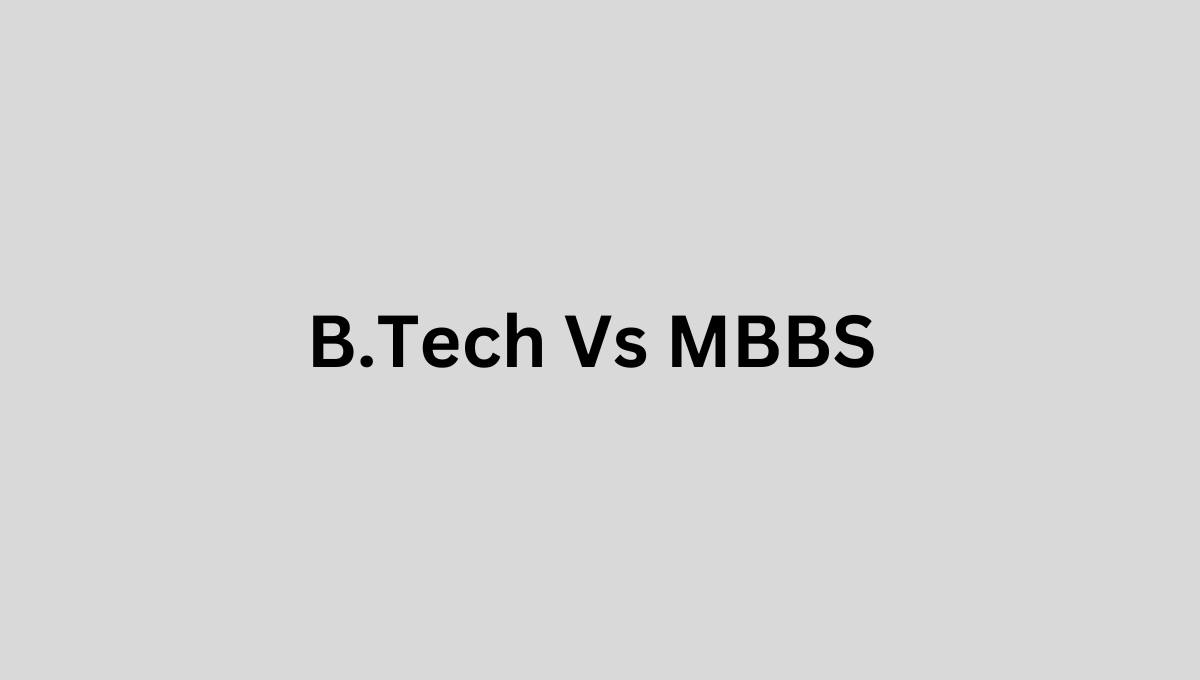B.tech vs MBBS: Selecting a career direction following high school or the 12th grade is a common dilemma, with two main options standing out: engineering or medical sciences. The conversation about engineering and medical sciences is a common phenomenon among pupils since both are in high demand in India, with many pleasing career options. This article will provide a detailed comparison between engineering and medical sciences.
B.tech vs MBBS a General Overview
| B.tech | MBBS | |
| Carrer objective | It focuses on designing, building and maintaining systems and processes. | This is a study of the human body, diseases, diagnosis, treatment and healthcare. |
| Entrance exam | Joint Entrance Exams (JEE) Main, Under-Graduate Engineering Entrance Exam (Uni-GAUGE), Consortium of Medical, Engineering and Dental Colleges of Karnataka (ComedK) and other state entrance exams | National Eligibility and Entrance Test (NEET) |
| Eligibility | 12th with physics, chemistry and maths. | 12th with Biology, physics, chemistry |
Course Duration
Bachelor of Engineering (B.E) and Bachelor of Technology (B.Tech.) degrees are undergraduate programs in engineering offering specialization areas such as mechanical, electrical, civil, computer science, electronics or aerospace engineering, among others.
These courses run for four years, which are divided into eight semesters. In addition to this, students can choose to have a Master’s degree in the same discipline, which takes two years divided into four semesters.
The undergraduate program for Medical Sciences is represented by the degree of Bachelor of Medicine and Bachelor of Surgery (MBBS), which usually lasts between five and six years.
They include a Master of Surgery (M.S.) as well as a Master of Medicine (M.D.). After completing MBBS, one may decide to proceed with their academic journey by doing fellowships or going further with doctorate studies in certain fields.
Course Curriculum
Each field is distinct, providing essential abilities and understanding within its area of expertise. In addition to the theoretical foundation, the study programs in engineering and medical sciences provide hands-on experience and real-world exposure to students through internships and visits to projects on location. Let’s explore some of the main topics included in each program.
Subjects of B.Tech
- Calculus
- Physics
- Mechanics
- Thermodynamics
- Electromagnetism,
- Materials Science
- Coding
- Engineering Visuals and Design
- Probability and Statistics
- Electrical Systems
- Systems Control
- Fluid Dynamics
- Heat Exchange
- Design of Machines
- Structural Evaluation
- Environmental Engineering
- Ethics in Engineering and Professional Conduct
- Project Leadership
Subjects in MBBS
- Anatomy
- Physiology
- Biochemistry
- Pharmacology
- Pathology
- Microbiology
- Immunology
- Genetics
- Ethics in Medical Practice
- General Practice
- Surgery
- Obstetrics and Gynecology
- Pediatrics
- Internal Medicine
- Radiology
- Psychiatry
- Emergency Medicine
- Public Health
- Epidemiology
- Research in Medicine and Clinical Studies
Job Prospects of B.tech Vs MBBS
Upon completing their studies, both engineering and medical sciences present a wide range of job opportunities for graduates. Likewise, the medical field is experiencing a surge in demand due to an aging population, growing healthcare requirements, and the development of new medical technologies. Let’s take a look at some of the job prospects in these areas.
Job Prospects in Engineering
The demand for contemporary infrastructure and sophisticated technology has opened up numerous job opportunities for engineers across various sectors. Here are some of the in-demand job roles in engineering:
- Civil Engineer: Civil engineers are responsible for the planning and supervision of infrastructure projects, including structures like buildings, bridges, highways, and water distribution networks.
- Mechanical Engineer: Mechanical engineers are involved in the design, development, and upkeep of mechanical systems and equipment, such as vehicles, engines, and heating, ventilation, and air conditioning (HVAC) systems.
- Electrical Engineer: Electrical engineers concentrate on the design and upkeep of electrical systems, which include power generation, electronics, and telecommunications.
- Computer Engineer: Computer engineers are involved in the creation and maintenance of computer hardware and software, including computer parts, networks, and systems.
Job Prospects for field practitioners
Throughout history, the maintenance of good health has been a primary requirement for humanity, thus leading to the high regard accorded to medical professionals for their role in saving lives in emergencies. We have therefore listed some of the main available careers that can be pursued in this field:
- General Practitioner: General practitioners handle patients as they come to them and offer essential healthcare services while also making diagnoses of any ailments and prescribing solutions.
- Specialty Physician: Specialty physicians gain additional training and education in a specific area of medicine, such as cardiology, surgery, pediatrics, or radiology, to become experts.
- Operating Surgeon: Operations surgeons do different types of operations, ranging from general surgeries to special surgeries like orthopedics, cardiology, or neurosurgery.
- Anesthesiologist: Anesthesiologists help administer anesthesia during surgical procedures and monitor the vital signs of patients.
- Radiologist: Radiologists examine diagnostic images, including x-rays, CT scans, as well as MRIs in order to determine different diseases and other medical conditions.
Final Considerations!
In the midst of the ongoing discussion about which profession to follow, it’s crucial to recognize the intricate nature of each field and make an informed decision. Embarking on a career in these areas demands a significant level of dedication and commitment.
Thus, it’s essential for a person to evaluate their abilities, passions, and future goals before deciding on a career in either of these areas. For those who excel in mathematics, physics, or conducting experiments, engineering might be the right path.
On the other hand, for those interested in a career focused on life sciences and human anatomy, a degree in medical sciences would be a suitable option.

